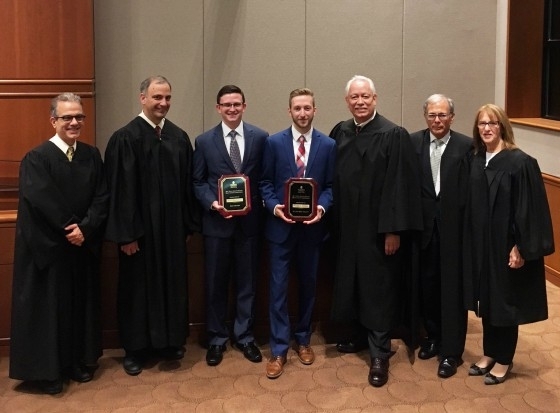
2017 Mollen Competition Judges and Finalists
Milton Mollen was one of the first Americans trained to use aircraft radar navigation. The skillset earned him a spot in the lead plane in a WWII Army Air Corps bomber squadron that often flew dangerous missions in the European theater.
Mollen was on a bombing run over Nazi-occupied France when his plane was shot down. Eight of the plane’s 12 crewmen died, but Mollen parachuted to the ground. Wounded, he told the other surviving crewmembers to go on without him. The Germans took Mollen prisoner, and put him in a POW camp. Eight months later, he escaped and made his way to Allied territory.
After the ordeal, when an Army psychiatrist asked if he’d be willing to fly more combat missions, Mollen said he would. The doctor diagnosed Mollen as having emerged from his terrible ordeal as “abnormally normal.”
The strength, selflessness, and resiliency that Mollen displayed as a young soldier would become the hallmarks of a man who lived his passion for public service and the law fully until he passed away in August at age 97.
A true son of New York City, Mollen was born and raised in Brooklyn, where he attended Samuel J. Tilden High School in East Flatbush. After his military service, he returned home to his young wife and enrolled at St. John’s University. Given his strong service and academic records, Mollen skipped his last year of college and started his legal education at St. John’s Law, where he excelled and earned a place on the St. John’s Law Review.
On the recommendation of the Law School’s dean, Mollen took a part-time job at a law firm while still in school and came on full time after graduation. When a member of the firm became New York City’s Corporation Counsel, he recruited Mollen as an assistant corporation counsel, launching a more than 40-year career in public service that took Mollen to key positions in city government and to senior roles on the bench.
After rising through the ranks at the New York City Law Department to become executive assistant corporation counsel, Mollen was named general counsel for, and, later, chairman of, New York City’s Housing and Redevelopment Board. A passionate advocate for urban renewal projects, he spearheaded the Mitchell-Lama Housing Program under Mayor Robert Wagner. The program eventually built about 100,000 middle-income housing apartments in the city.
Mollen took the bench when Mayor John Lindsay appointed him to the New York City Criminal Court. He then served in Kings County Supreme Court, and as the administrative judge of courts in Kings County and Richmond County, before being designated an associate justice of the Appellate Division, Second Department, where he later served for 12 years as Presiding Justice.
During his tenure on the appellate bench, Mollen wrote a precedent-setting opinion on consequential damages and penned an influential right-to-die decision. He also instituted a policy of issuing a written opinion in every case, asserting that all parties before the court deserved a reasoned decision.
Although he retired from the bench, Mollen returned to serve the city he loved as Deputy Mayor for Public Safety under Mayor David Dinkins. In this role, Mollen helped to secure state funding for the Safe Streets, Safe City program that put 6,000 new police officers on the streets and created community centers for children across the city.
Mollen left his Deputy Mayor post, but was called back into service once again, this time to head the city's Commission to Investigate Allegations of Police Corruption and the Anti-Corruption Procedures of the Police Department (aka the Mollen Commission). The Mollen Commission’s report, which revealed several pockets of serious corruption in an otherwise honest and hardworking police force, led to the establishment of a permanent and independent monitoring board—the Commission to Combat Police Corruption.
In the years that followed, the FBI, DEA, and several cities tapped Mollen’s expertise in fighting corruption. And, at the request of the UN, he lectured in India and Germany on setting up anti-corruption procedures.
Following his full and fulfilling career in public service, Mollen founded the New York Office of the Judicial Arbitration and Mediation Services (JAMS), the world’s largest private alternative dispute resolution provider, where he was a mediator and arbitrator for several years. He also returned to private practice, serving of counsel to Herrick Feinstein LLP until his retirement last year.
Throughout an exemplary life of service to his country, his city, and his community, Mollen remained a devoted alumnus of St. John’s Law. “In addition to providing my father with a wonderful education and with career direction, the Law School afforded him an opportunity to teach and work with students and to help lead the Alumni Association, which he loved to do,” says Scott E. Mollen '72, a partner at Herrick and a former adjunct professor of law at St. John’s.
Each fall, the Law School honors the elder Mollen’s remarkable legal career and contributions to the public good by hosting the Hon. Milton Mollen Moot Court Competition. The competition now stands as an enduring tribute to a man whose wisdom, integrity, and compassion are forever etched in the fabric of New York City and the St. John’s Law community.
“People are often honored after they die,” Scott Mollen notes. “While he was with us, the Law School honored my father by establishing the competition, which encompasses his love for the school, its students, and the courts. My father received many honors in his life, but he always said that it’s truly meaningful if the recognition comes from the people who know you best. So he was extremely touched by this honor, which was bestowed upon him by his ‘family’ at St. John’s Law. His ‘other’ family, my sister, Ellen, his grandchildren, great grandchildren, and I, thank St. John’s for the many significant ways it has impacted our lives.”
